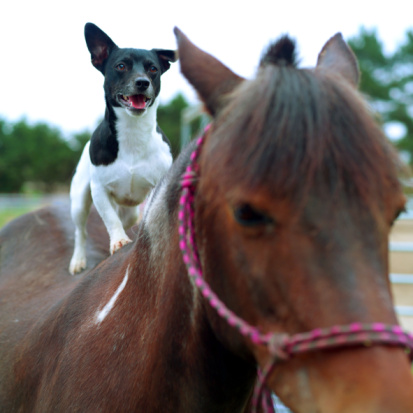 When I started graduate school several years ago, I visited many boarding stables looking for just the right place for my horses. As I approached yet another farm, I had to step hard on the brake and do a double-take. Over a ridge in the pasture alongside the road came a most unlikely threesome—a horse and a dog were galloping in tandem toward my truck, with a Holstein calf leading the way! When I asked the stable owners about it later, they told me the calf and the horse were inseparable, that in fact the calf seemed to think he was a horse and behaved just like one! He had evidently been reared around both horses and dogs and had been adopted by the gregarious horse.
When I started graduate school several years ago, I visited many boarding stables looking for just the right place for my horses. As I approached yet another farm, I had to step hard on the brake and do a double-take. Over a ridge in the pasture alongside the road came a most unlikely threesome—a horse and a dog were galloping in tandem toward my truck, with a Holstein calf leading the way! When I asked the stable owners about it later, they told me the calf and the horse were inseparable, that in fact the calf seemed to think he was a horse and behaved just like one! He had evidently been reared around both horses and dogs and had been adopted by the gregarious horse.
You may have seen this sort of bond between species with your own horse and dog. I’ve seen it with my mare, Duchess. One dreary afternoon last winter I drove out to the barn hoping to squeeze a short ride into my hectic schedule. I briskly tacked her up and led her into the indoor arena. Realizing I’d forgotten my helmet, I left Duchess at the mounting block while I ran back to the barn to grab it. When I returned, I saw that a very friendly barn kitten had climbed the mounting block steps to make acquaintance with my mare. Duchess had lowered her head to cat level and was curiously investigating her new friend while the kitten did the same. Awareness of my approach brought an early end to the budding relationship as Duchess turned her attention toward me and the kitten hastily scurried away. I wondered what had motivated the kitten to brazenly approach such a large creature, and why my mare had handled the encounter with an unknown animal with such gentleness.
The unique qualities of individuals such as my mare Duchess and the variability within a species such as the horse make behavior a science where absolute answers are hard to come by. Behaviorists, therefore, must make generalizations based on the behavioral tendencies of samplings of horses representing the population at large.
Most behavioral scientists agree that the reason such amicable alliances form between horses and other animals is due in large part to the horse’s unique social nature. According to Stephen Budiansky, author of The Nature of Horses, horses show a strong fundamental instinct to form long-lasting attachments to specific individuals. This basic instinct toward bonding is the glue that holds harems, the fundamental social structure of the horse, together. But so general is this drive to bond that it appears within horse society in many contexts that have nothing to do with mating. Horses removed from a herd will also readily form attachments to human owners or even a barn cat.
That is if the cat will have them. In general, cats are considered nonsocial because they do not live in groups as adults if they are living on natural prey. When placed together in a home or farm, cats will form dominance hierarchies, but marked aggression may persist in this essentially solitary species. A cat will generally do its utmost to define a territory of its own and to be self-reliant.
Dogs, on the other hand, are more like horses in that they are members of a species that forms “packs” with social bonds. What makes them different from horses is the reason for the social order—they form packs to better bring down prey, living as a group to hunt more successfully. Hence, for dogs membership in a pack is very desirable, but not a necessity for survival.
In contrast to these companion-animal species, horses, as prey animals, must rely upon each other for survival. As a result of this mutual dependence, the bond between horses is very strong. You’ve probably noticed this when trying to take your horse out for a ride without his equine buddies. Cows and goats, which are also prey herd animals, may share just as strong an attachment to their equine companions as the horse will.
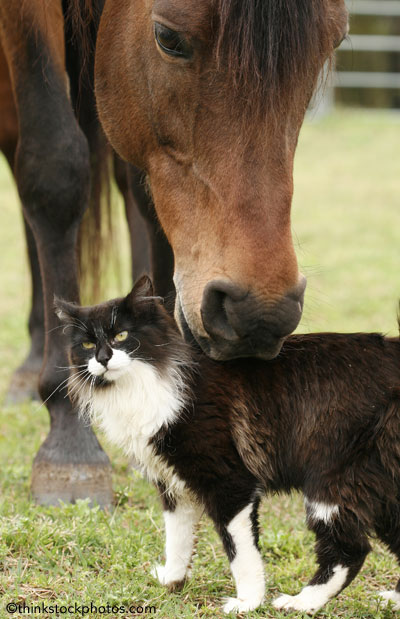
So where does the horse rank in comparison to other companion animals in terms of intelligence? As I discussed in a previous column, intelligence is difficult to define in animals because we do not share a language with them. On the other hand, learning ability can be measured by trying to quantify the time it takes the horse to learn tasks or solve problems. So it makes a little more sense to try to compare the learning abilities of different species rather than their innate intelligence.
R.K. Thomas published a study review conducted on vertebrate “intelligence,” which suggested that horses score very well in comparison to other species on learning tests. Using discrimination learning, in which animals must select a specific item to earn something rewarding, Thomas reported that horses achieve high scores in comparison to other species, including many mammals.
While horses can certainly hold their own against other species in terms of learning ability, the type of learning that horses excel at is not the same as that of dogs or cats by nature. Remember, what matters for horses is to learn to survive as a flight animal — being able to recognize other herd members and to discriminate them from potential enemies; to sense danger and to react appropriately. Dogs and cats, however, must be tactical thinkers — they must select prey and devise a strategy to overpower or head off the prey. While each of the companion species is “smart,” natural selection has designed them to think and behave very differently. Horses will naturally be more reactive, dogs and cats more cunning.
So, while many different types of animals have the potential to become your companions, you’re likely to find their species-specific behavior very different. A relationship with a cat, dog or horse will have its own unique qualities, depending on the individual animal and the nature of the species. In general, the cat will be the most aloof of the three main companion species, the dog the most like our own predatory and social species. Of the three, the social horse is the most unlike us.
By bridging the gap between ourselves and an animal that often falls victim to species such as ours, we gain something of value for our own humanity. Perhaps this is the true appeal of building a relationship with a horse.
Liked this article? Here are others you’ll enjoy:
Dogs and Horses
The Benefits of Barn Cats


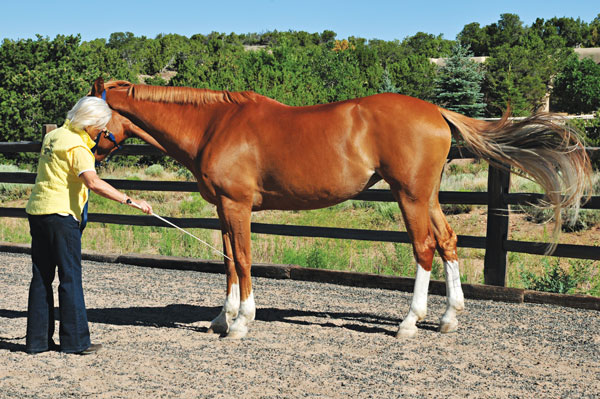
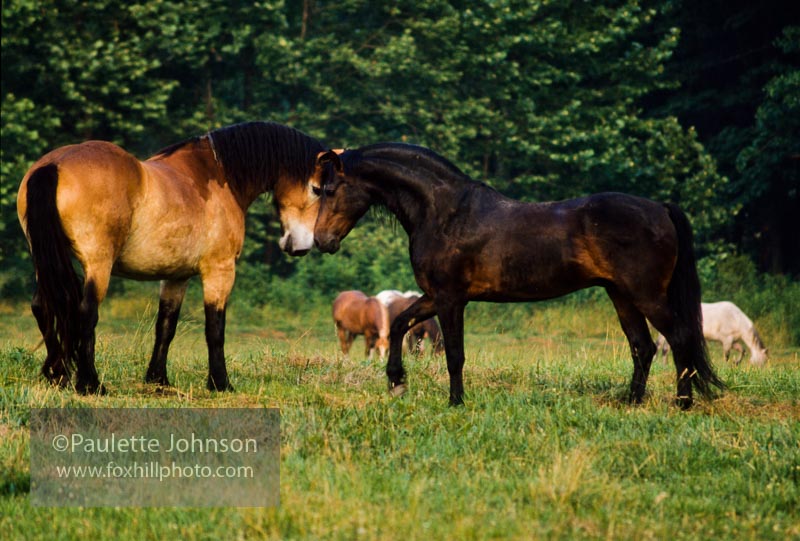
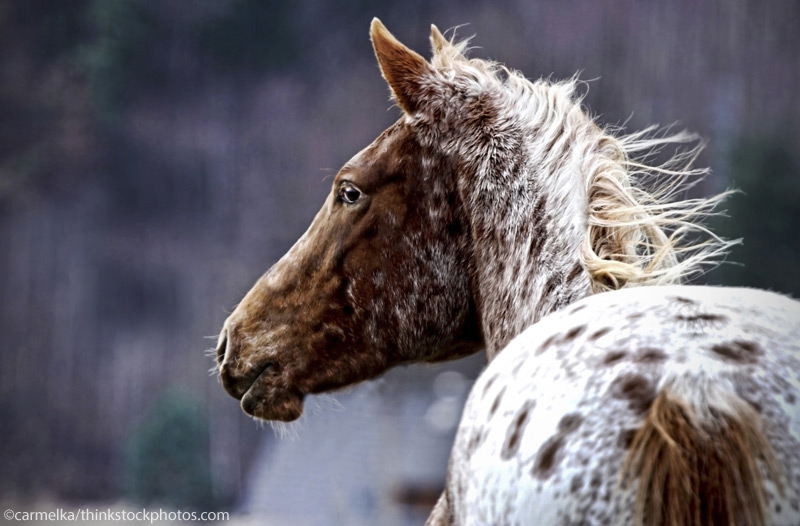

If you look up Eco Research The Horse Project, you will find info on an equine cognition study. The horses in the study all know at least 200 words. One of them knows over 250 words and has learned some concepts. As far as linguistic intelligence goes,this would show that they are (at least) as intelligent as a toddler(I think a 2 yr old.)Dogs are said to be as intelligent as a 2 or 3 yr. old child.
Really interesting. Well-written. Reinforced some knowledge and offered new research-based information.
Fascinating article. I would be interested in seeing a intelligence comparison between the 3 companion animals.